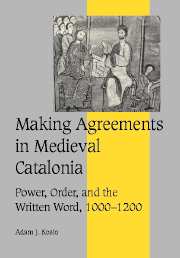Book contents
- Frontmatter
- Contents
- List of figures
- List of tables
- Acknowledgments
- Note on citations, dates, and names
- List of abbreviations
- Map
- INTRODUCTION
- 1 THE FIRST CONVENIENTIA: SOCIAL AND DOCUMENTARY CHANGE AROUND THE YEAR 1000
- 2 MAKING AGREEMENTS
- 3 KEEPING AGREEMENTS
- 4 FOUNDATIONS (THE ELEVENTH CENTURY)
- 5 FORTUNES (THE TWELFTH CENTURY)
- 6 WRITING AND POWER
- Table of published documents
- Works cited
- Index of names
- Subject index
- Cambridge Studies in Medieval Life and Thought Fourth series
INTRODUCTION
Published online by Cambridge University Press: 09 July 2009
- Frontmatter
- Contents
- List of figures
- List of tables
- Acknowledgments
- Note on citations, dates, and names
- List of abbreviations
- Map
- INTRODUCTION
- 1 THE FIRST CONVENIENTIA: SOCIAL AND DOCUMENTARY CHANGE AROUND THE YEAR 1000
- 2 MAKING AGREEMENTS
- 3 KEEPING AGREEMENTS
- 4 FOUNDATIONS (THE ELEVENTH CENTURY)
- 5 FORTUNES (THE TWELFTH CENTURY)
- 6 WRITING AND POWER
- Table of published documents
- Works cited
- Index of names
- Subject index
- Cambridge Studies in Medieval Life and Thought Fourth series
Summary
On 6 July 985, the armies of the Cordoban dictator al-Manṣūr breached the walls of Barcelona and sacked the city. The Arabic chroniclers give the impression that this was just another successful raid, and there is no reason to believe that al-Manṣūr thought any differently. It was, after all, his twenty-third campaign in just nine years. From the perspective of Barcelona, however, the event was of capital importance, not only because of its effect on the city itself, but for its impact on the imagination of her inhabitants. An early and strong historiographical tradition sees in the events of 985 a formative step in the creation of a Catalan national identity. After the Carolingian reconquest of Barcelona in 801, Charlemagne organized the region between the Conflent and the Ebro River into the Spanish March. Over the course of the ninth and tenth centuries, Barcelona came to predominate over the other counties in the region. While the counts remained loyal to the faltering Carolingian house, they began to operate in an ever more independent fashion. The last Frankish military expeditions into the area took place in the 820s; Guifré I “the Hairy” of Barcelona (878–97) was the last count to be appointed by a Frankish king, Guifré II of Besalú (941–57) the last to swear fidelity.
- Type
- Chapter
- Information
- Making Agreements in Medieval CataloniaPower, Order, and the Written Word, 1000–1200, pp. 1 - 25Publisher: Cambridge University PressPrint publication year: 2001



